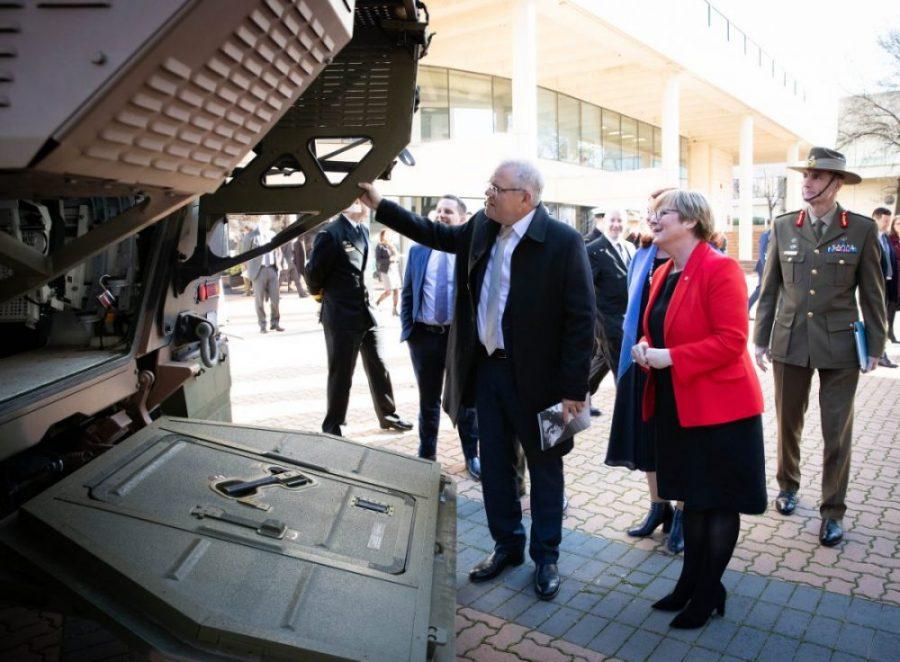
Scott Morrison’s speech at the launch of the defence strategic update and new force structure plan was fascinating. No fewer than four times he said that the deterioration in Indo-Pacific security was as concerning as the slide to global war in the 1930s.
In a comment not in his prepared notes, the prime minister said, ‘That period of the 1930s has been something I have been revisiting on a very regular basis, and when you connect both the economic challenges and the global uncertainty, it can be very haunting.’
My sense is that Morrison and Defence Minister Linda Reynolds understand just how dangerous our security situation is getting. We are heading to a potential military crisis at some point in the next year or two around the first island chain that borders the approach to the People’s Republic of China.
The biggest change in the strategic update is temporal, not geographic. The Indo-Pacific—now defined for defence planning purposes as the northeastern Indian Ocean, Southeast Asia, Timor-Leste and the Pacific islands—has been at the core of Australian strategic thinking for decades.
What is new is the realisation that the risk of conflict is upon us right now, not a comfortably distant 20 years away. In fact, the update abandons a long-held strategic view that we would have 10 years of ‘strategic warning time’ to prepare for a large-scale conflict.
This judgement will force massive change in how we produce and stockpile ammunition, fuel and critical defence supplies, and leads the strategy to say that Australia should look to manufacture our own complex guided munitions.
We should soon get more detail on a plan to acquire a precision-strike missile, launchable from combat aircraft and ships, adding hundreds of kilometres to the range of deployed forces. In effect, any major war Australia is involved in will most likely start in maritime Southeast Asia. The aim is to keep our opponents as far as possible from our landmass.
Nor will this be Australia operating alone. We are likely to be alongside a range of countries equally as worried about the PRC’s attempts to dominate the region.
Another decision adds to our over-the-horizon radar network so that the system can look east as well as northwest and north. I expect the concern here is the PRC’s relentless influence-building with the Pacific island countries, and the People’s Liberation Army’s desire to establish a naval base.
Australia has not had to worry about a security threat from the east since the battle of the Coral Sea in 1942. If you want to understand why China so consistently puts out the red carpet for Pacific island leaders in Beijing, you should read up on the Imperial Japanese Army’s Pacific War plans.
Ultimately the Chinese Communist Party wants to impede US access to the western Pacific. A strong PLA presence through the Pacific region achieves that goal. Morrison’s Pacific ‘step-up’ is as important to Washington as it is to Canberra.
The strategic update and force structure plan are a welcome and necessary reset to defence thinking, and aim to give Defence more hitting power and deterrent value.
Now comes the hard part: the many new equipment proposals must be paid for and delivered in strategically relevant timeframes.
The government has said that about $270 billion will be spent on defence capabilities over the next 10 years. This is not new money, but the continuation of the plan set out in the 2016 defence white paper, with five more years of spending plans (2025–2030) now visible.
Most of that $270 billion remains committed to existing projects like the Collins submarine life-of-type extension, the future submarines, the future frigates and the bulk of F-35 program costs. The strategic review does indeed shelve some equipment projects—there will be no more C-17 aircraft and the army’s long-suffering ‘G-Wagon’ program for non-combat vehicles is gone.
A reasonably educated guess might say that $50 billion of the $270 billion is free to be allocated to long-range missiles, hypersonic and directed-energy weapons, autonomous land, sea and air vehicles, satellite constellations, amphibious ships and the rest.
The government no longer wants to link defence spending to the ‘target’ of 2% of gross domestic product. Fair enough, but we should be clear that what we have here is a defence plan that, in maturity, looks more like 3.5% of GDP.
In the last Cold War, defence budgets tended to be 3.2% to 3.5% of GDP. If the 1930s-style slide to war continues, that’s where our defence spending must head too.
Morrison should now apply his strategic lens to Australia’s thin diplomatic effort in Southeast Asia. Leadership carries costs. We must work with the region to show that it’s possible to push back against PRC domination.